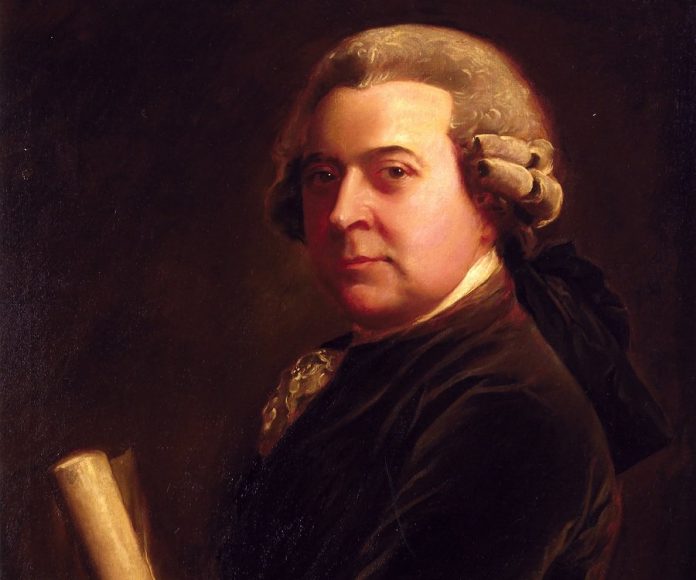John Adams, the second President of the United States, is best known for the quote, “Our Constitution was made only for a moral and religious People. It is wholly inadequate to the government of any Other.” This is a great quote, but one that is seldom understood.
The quote comes from a letter John Adams wrote to the officers of the First Brigade of the Third Division of the Massachusetts Militia, and said, “While our Country remains untainted with the Principles and manners, which are now producing desolation in so many Parts of the World: while she continues Sincere and incapable of insidious and impious Policy: We shall have the Strongest Reason to rejoice in the local destination assigned Us by Providence. But should the People of America, once become capable of that deep simulation towards one another and towards foreign nations, which assumes the Language of Justice and moderation while it is practicing Inequity and Extravagance; and displays in the most captivating manner the charming Pictures of Candour frankness & sincerity while it is rioting in rapine and Insolence: this Country will be the most miserable Habitation in the World. Because We have no Government armed with Power capable of contending with human Passions unbridled by morality and Religion. Avarice, Ambition, and Revenge or Galantry, would break the strongest Cords of our Constitution as a Whale goes through a Net. Our Constitution was made only for a moral and religious People. It is wholly inadequate to the government of any Other.”
There is a lot in that paragraph to break down. The first thing one might notice is the profound wisdom John Adams showed when he asked Thomas Jefferson to draft the Declaration of Independence. Had John Adams written the Declaration of Independence, King George might still be trying to figure out what, exactly, it said.
At the same time, we cannot easily criticize John Adams’ clarity of thought, nor the profound wisdom in his words.
John Adams was a brilliant, noble, and wise man.
We have all heard the last two sentences before: “Our Constitution was made only for a moral and religious People. It is wholly inadequate to the government of any Other.” This is a famous quote, and these two sentences themselves are fairly clear, but there is much in the rest of the paragraph that helps to clarify what these two sentences mean.
In the first part of the paragraph, John Adams was discussing the corruption and insincerity of the governments of Europe – governments that spoke of principles, and that were composed of gentlemen with impeccable manners, but who were unconcerned with the people under their care.
It is important to note that Europe was, by and large, still feudalistic. Feudal societies had three classes: lords, free people, and serfs. Lords were appointed by the King (and their titles were hereditary), and they literally owned everything on their lands. The nobility made up about 1% of society. Free people were property owners who did not have titles, and were generally merchants or tradespeople. One might call the free people the ‘middle class’ of the day, and they made up about 9% of society.
90% of the people within a feudal society were serfs. Serfs are owned by the noble lords upon whose lands they live, and if that sounds like slavery, it is.
The Europe of John Adams’ day was a highly structured caste society, even in places like England, where actual serfdom had been eliminated (but where, as in the case of slavery within the United States, it took longer for effective serfdom to go away).
John Adams opens his paragraph by comparing us to the feudal system of Europe, which was unconcerned with the lives of 90% of the people, and was thus corrupt and insincere, even as the nobility behaved with impeccable manners. For as long as we could remain unlike Europe, we would, “have the Strongest Reason to rejoice in the local destination assigned Us by Providence.”
<<NOTE: John Adams was an abolitionist, who saw that slavery made the South essentially no different than Europe. Through slavery, the South employed what was for all intents a feudal system, with lords (plantation owners), nobility (the families of the plantation owners), free people (other white people), and slaves. The lives of the vast majority of white people in the South were not much better than those of the slaves in the South, mirroring Europe in the sense that 90% of the populace lived in abject poverty. None of this was lost on John Adams.>>
The next part of the paragraph provides a warning. John Adams says that if we start to act like Europe, denying the natural rights of our fellow human beings (while giving natural rights lip-service, or ‘simulations,’ as John Adams put it), we would be speaking of justice while creating the opposite, and our country would become “the most miserable Habitation in the World.”
John Adams throws another warning at the rich, where he extols against ‘Inequity and Extravagance’. I’ve seen this part of Adams’ letter quoted by socialists as ‘proof’ that John Adams was, at heart, a socialist, but really, what John Adams wanted was for the rich to be intentionally generous with their own money. John Adams was very much in favor of voluntary philanthropy, but he was NOT in favor of excessive taxation, and this fact feeds into the most famous part of the paragraph: “Our Constitution was made only for a moral and religious People. It is wholly inadequate to the government of any Other.”
It is important to note that John Adams was not a firm believer in the Establishment Clause, as though he did not want the state to establish a specific religion, John Adams did want the state to recognize that the United States was a nation of Christians. John Adams was very clear on that point on many occasions, saying that ‘We are not a Christian Nation, but we are a Nation of Christians.’ Taken in context then, John Adams was saying that, should we lose our Christian morality (or the fear of God that underpins it), we must then scrap the Constitution, and submit ourselves to the rule of some lordship.
John Adams believed that liberty, morality, and Christianity were inexorably linked, and that an attack upon any one of those things was an attack upon all of them.
To John Adams, behaving ‘properly’ was morally repugnant, unless what was ‘proper’ was founded in Christian morality. John Adams abhorred noble Lords who would bow politely, while treating the people under their care with derision and scorn, and would openly scoff at those in King George’s court, who stuck their pinkies out to drink tea, while denying the natural rights of their fellow citizens.
There were many people, in John Adams’ day, who followed Christian morals, without believing in Christ, and though John Adams never wrote anything directly about that (at least not that I know of), I have to think John Adams viewed Christian morals as being necessary for the governance of the state, and religious belief as necessary for the maintenance of Christian morality. In other words, if people lived Christian values, that would suffice for the preservation of the state.

Today, one might say that the culture of Christianity is more important to the underpinnings of society, than is actual belief in Christ.
It is not hard to imagine what John Adams would think of today’s United States. He would view the political right as being largely unconcerned with Christian virtue, and the left as being wholly unconcerned with Christian morals. John Adams would view political correctness as the “Principles and manners, which are now producing desolation in so many Parts of the World,” while also scoffing at the “Inequity and Extravagance” the political right tolerates.
In a John Adams’ based society, government would be small, but government largesse would be unnecessary. Schooling would be private, but also free – those with means giving amply to support the schooling of others. The poor would be taken care of, but in a way that does not ‘deny their dignity,’ which means that charity would make the poor as self-sufficient as possible, while also taking care of their day-to-day needs.
Virtually everything the left wants the state to do, John Adams would look at and say that if it is necessary for the state to do those things, it is only because of the moral failings of the people. To the rich, John Adams would likely say, “If you cannot, or will not, provide for the poor, then it is incumbent upon the state to do so.”
John Adams would not consider things like welfare to be Constitutional, but nor would he consider America, as it stands today, to be in any way worthy of the United States Constitution. As he put it, “Our Constitution was made only for a moral and religious People. It is wholly inadequate to the government of any Other.” As we become ‘any Other,’ our Constitution becomes ‘wholly inadequate’…
I, personally, think that John Adams was correct. Our country is not worthy of our Constitution. The left has allowed our morality to collapse to the point where tolerance of immorality has become the only moral virtue, whereas much of the political right claims Christian belief without displaying Christian virtue. We are lost.
I am driven by the desire to build a state in which the Constitution can be applicable, and I stand against those who believe our foundational values should be discarded, along with our Constitution. It is unclear who will prevail, but what is clear is that John Adams was right about the link between liberty, morality, and Christianity, and as such, unless the political right can convince the political left that Christian values are necessary (‘not a Christian Nation.. but a Nation of Christians’), liberty will become impractical, and this nation will become “the most miserable Habitation in the World.”
What we on the right need to acknowledge is that, whereas the left can completely destroy this country without us, we cannot possibly rebuild it unless we can bring the left back into the fold.
If you agree with this message, please consider sharing with the buttons attached to the article. You can also support The Daily Libertarian by donating through Patreon, at https://www.patreon.com/wgarneau.




















